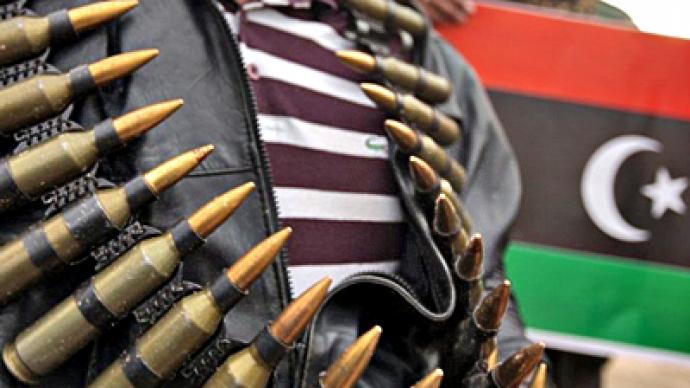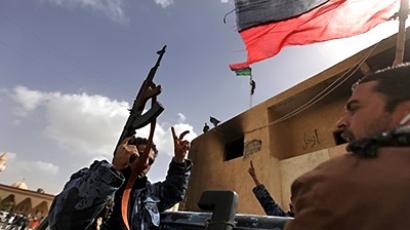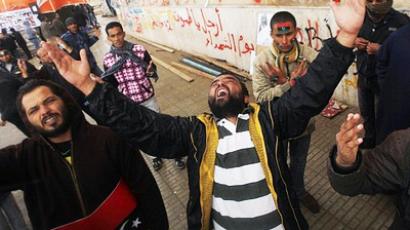Libya descending into chaos

The bloodshed in North Africa continues as the Libyan army is once again reported to have fired live rounds at protesters in Tripoli. Forces loyal to Colonel Gaddafi are said to have lost control over most of the country's territory.
The country is in complete disarray at the moment. Anti-Gaddafi protesters are taking more ground by the day. They are now controlling most of the country, their main foothold being in Benghazi. On Sunday protesters have reportedly captured the town of Zawiyah, located just 50 kilometers from the capital Tripoli. Police stations and government offices inside the city have been torched, Al Jazeera television reports.The capital Tripoli, however, remains in the hands of Colonel Gaddafi and the forces that are still loyal to him. On Friday Gaddafi’s son, Saif, said that neither he, nor his father would leave Libya while alive. Reports suggest that security forces in Tripoli are arming civilians loyal to the regime.According to various sources, from 600 to 2,000 people have lost their lives in an ongoing popular uprising in Libya, while around 4,000 have been injured. About 100,000 people, including foreigners, have fled the country in the past week, Reuters news agency reports.
International sanctions
The international community is condemning what is happening in Libya. UN Secretary General Ban Ki-moon has urged the Security Council “to act quickly on a proposed package of UN sanctions aimed at forcing Libyan leaders to end their violent crackdown in the country,” Reuters news agency reports.The UN Security Council has voted to impose sanctions against Muammar Gaddafi and his regime in Libya. The resolution received all 15 votes during the Saturday session in Brussels. The Council supported an international travel ban and freezing of assets for Gaddafi, his immediate family members and loyalists (16 people in total), as well as an arms embargo. The Security Council also referred Gaddafi to the International Criminal Court for prosecution for alleged crimes against humanity.The US has decided on issuing sanctions against the Gaddafi government and family and top Libyan businesses, after the majority of American citizens have been removed from the country. President Obama said that the actions of Gaddafi, his government, and close associates constitute an unusual and extraordinary threat to the national security and foreign policy of the United States. The UK and other European nations are following suit, promising they will put pressure on Gaddafi.Russian Foreign Minister Sergey Lavrov had a telephone conversation with his Libyan counterpart Moussa Koussa on Saturday. Following the conversation, the Russian Foreign Ministry announced that Russia urges Libyan authorities to stop repressive measures against the people. "Lavrov stressed the impermissibility of the use of arms by the Libyan authorities against civilians," the Ministry announced. "The international community strongly condemns such actions and demands the respect for human rights and international humanitarian laws and the provision of security of civilians and foreign nationals."
President of the British-based Arab Lawyers Association, Sabah al-Mukhtar, shared his prognosis on how the situation in Libya might unfold in the very near future. “I think Gaddafi will disappear from the scene in the next couple of days, probably, a little longer. I think it will end up in bloodshed, he is going to kill more people and then he will follow Hitler or Mussolini type of thing: either he is hung or he will commit suicide,” he said. “He will go down fighting because he is a stubborn man. He does not care about the price the people are paying. I think he will definitely go but it is the people who are going to stay there whom we will have to deal with in the future.”
According to author and journalist Afshin Rattansi, western countries are backing not so much democracy in Libya, but rather their own political interests. “The western powers are not interested in democracy in Libya. What they are interested in now is the oil,” he said. “What we now know is that so many banks are involved in the Libyan government, so many oil companies. They will be working with US forces with other elements of European Union forces and what we must not allow, as Fidel Castro said quite early on in this saga of Libya, the recent events, we must not allow a NATO invasion of Libya.”
No end to unrest in sight
Unrest is continuing across the region. Friday saw another mass protest in Tahrir Square in Egypt. People went out to show support for Libya and to call for people detained during the uprising in Egypt be freed.They also displayed dissatisfaction with some of Mubarak’s men still being in seats of power – in particular, people are calling for Prime Minister Shafik to be removed.People in Tunisia also followed suit, with protests against people of the former regime who remain in power.At least nine people were killed during protests in Iraq as people came out to show their dissatisfaction with the government.In Yemen and Bahrain protests also continue. Crowds were dispersed by police in Yemen, and in Bahrain there were both anti-government and pro-government protests, police having difficulty trying to stop them from clashing.














